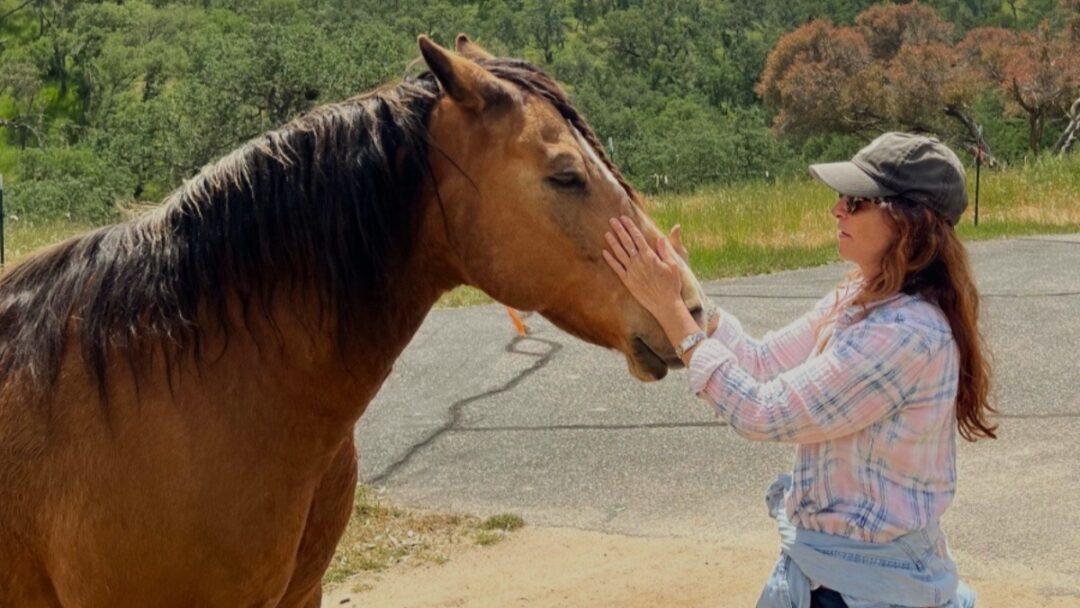
I recently co-facilitated a retreat that blended the ancient wisdom of horses with the ancient wisdom of the Enneagram. This pairing provided such incredible insights for the participants. First, let’s do a primer on the Enneagram. The Enneagram is a robust personality typing system with roots in the distant past, yet it’s been scientifically validated more recently. There are 9 primary Enneagram types, reflecting distinct ways of thinking, feeling, and being. It’s developmental in nature, providing a framework for growth and full expression. I’ve been working with it for about 10 years now, and I’m just now starting to get the hang of it. It’s a very nuanced assessment, with many factors affecting its accuracy. However, once a person is clear on their primary type, they will deeply understand what makes them tick and what’s likely to trigger them. As we all know, this awareness is the first step to intercepting automatic reactive patterns.
Now that we’ve covered the basics of the Enneagram, let’s play with horses! Horses are keenly tuned into our energy, actions, and level of congruence. Both the positive and more challenging qualities of each Enneagram type might show up in the round pen. Our horse co-conspirators can be extraordinary partners for participants to experiment with these qualities. How do their more challenging qualities impact the interaction with the horse? How do the more positive qualities, if expressed and amplified, alter the horse’s reaction?
Here’s a rundown of each type’s qualities that might make an appearance in the roundpen.
Enneagram 1️⃣ – Reformers will focus on growth and improvement in their experience. However, their perfectionist tendencies might override their ability to stay present, and they might try to explain exactly why things didn’t go the way they’d hoped.
Enneagram 2️⃣ – Helpers have the opportunity to experience the freedom of expressing their needs clearly and safely, and with no fear of judgment. They might be overly concerned about the horse’s needs and wants. They might also have a hard time making clear requests.
Enneagram 3️⃣ – Achievers can have an amazing time with horses by simply letting go of their task list in order to simply be, experiment, and PLAY with the horses. This inattention to outcomes can be so liberating for a 3.
Enneagram 5️⃣ – Investigators love to deep dive into knowledge, finding comfort in the knowing. They have an opportunity to tap into their hearts to simply be and feel with a horse, without the need to fully understand the nuts and bolts of horse behavior.
Enneagram 6️⃣ – Loyalists are highly relational, allowing them to easily bond with a horse. They will likely be focused on potential outcomes and how to both risk mitigate “failure” and optimize “success”. They might bring a dose of worry into the pen.
Enneagram 7️⃣ – Enthusiasts will likely have a lot of fun regardless of the outcome. They’re likely to experiment a lot with the horse simply for the joy of the experience. However, if they don’t have success with something, instead of sticking with it and experimenting/iterating, they might drop it in favor of trying something else.
Enneagram 8️⃣ – Challengers might bring a lot of intensity, directiveness and control into the roundpen. Horses feel safe when they sense congruence and clarity. Grounded Challengers can put a horse at ease through their natural inclination to lead and be direct in their communication. They will naturally go into leadership versus partnership mode with the horse, which the horse may or may not respond to in the way 8s are used to. 8s can intensify and calm their energy to experience the impact on the horse.
Enneagram 9️⃣ – Peacemakers orient towards stability and calm within systems, and usually bond well with horses. They will likely have very specific internal intentions about what they would like the horse to do, but will tend to be indirect, vague, and unclear about communicating that intention to the horse.
Here are a couple of examples of how the Enneagram + Equus participants benefited from the workshop:
-
One woman came in, certain she was a Type 8 Challenger. During a non-verbal team herding exercise, she experienced no leader energy. She noticed she was following and keeping tabs on the group’s energy and movement. Following the workshop, she came to realize she was actually a 9 – a Peacemaker!
-
Another person came in positive she was a 3 – an Achiever. During her 1:1 equine coaching, she had every intention of having her horse helper execute a series of tricks. As she entered the round pen, she noticed a deep sense of wanting to know the horse’s needs. The goal-oriented part of her dropped by the wayside, and what emerged was the desire for connection and partnership. Her world was rocked a bit as she eased into the realization that she was actually a 2 – a Helper.
The energetic sensitivity of horses magically allows people to tap into their true enneagram essence. As people realize that essence, there’s an almost audible sigh of relief. A sinking into acceptance of self. And from that acceptance comes deep self-awareness and a path for growth.
* You can hear Janine talk about Equus + Enneagram on our latest YouTube episode.